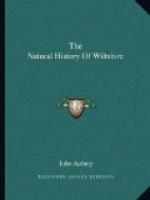Tilting. Tilting was much used at Wilton
in the times of Henry Earle of Pembroke and Sir Philip
Sydney. At the solemnization of the great wedding
of William, the second Earle of Pembroke, to one of
the co-heires of the Earle of Shrewsbury, here was
an extraordinary shew; at which time a great many
of the nobility and gentry exercised, and they had
shields of pastboard painted with their devices and
emblemes, which were very pretty and ingenious.
There are some of them hanging in some houses at Wilton
to this day but I did remember many more. Most,
or all of them, had relation to marriage. One,
I remember, is a man standing by a river’s side
angling, and takes up a rammes-horne: the motto
“Casus ubiq{ue} valet”. — (Ovid de
Arte Amandi.’) Another hath the picture of a
ship at sea sinking in a storm, and a house on fire;
the motto “Tertia pestis abest”; meaning
a wife. Another, a shield covered with black
velvet; the motto “Par nulla figura dolori”.
This last is in the Arcadia, and I believe they were
most of them contrived by Sir Philip Sydney.
Another was a hawke lett off the hand, with her leashes
hanging at her legges, which might hang her where’ere
she pitcht, and is an embleme of youth that is apt
to be ensnared by their own too plentifull estates.
___________________________________
’Tis certain that the Earles of Pembroke were
the most popular peers in the West of England; but
one might boldly say, in the whole kingdome.
The revenue of his family was, till about 1652, 16,000li.
per annum; but, with his offices and all, he had thirty
thousand pounds per annum, and, as the revenue was
great, so the greatnesse of his retinue and hospitality
was answerable. One hundred and twenty family
uprising and down lyeing, whereof you may take out
six or seven, and all the rest servants and retayners.
___________________________________
For his lordship’s musick. Alphonso Ferrabosco, the son, was Lord Philip (the first’s) lutenist. He sang rarely well to the theorbo lute. He had a pension and lodgings in Baynard’s Castle.
PART II. — CHAPTER III.
Oflearned men that had pensions
granted to them
by
the earles of Pembroke.
In the former Chapter I endeavoured to adumbrate Wilton House as to its architecture. We are now to consider it within, where it will appeare to have been an academie as well as palace; and was, as it were, the apiarie to which men that were excellent in armes and arts did resort and were caress’t, and many of them received honourable pensions.




